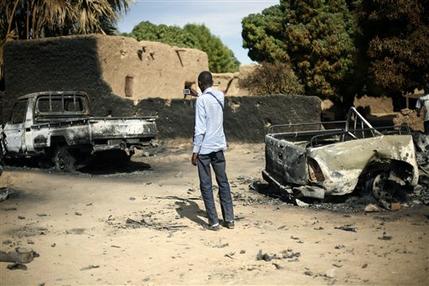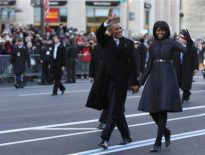SEGOU, Mali (AP) — Malian forces on Tuesday controlled the strategic town that was under extreme Islamist rule for four months, as the French-led military intervention pushed northward in its second week.

Douentza had been the outer edge of Islamist rebel control until the militants surged southward earlier this month. While far from the capital, Douentza is only 190 kilometers (120 miles) from Mopti, which marks the line-of-control held by the Malian military.
On Monday, French and Malian troops arrived in Douentza to find that the Islamists already had retreated from the town, local adviser Sali Maiga told The Associated Press.
“The Malian military and the French army spent their first night and the people are very happy,” Maiga said Tuesday.
A curfew went into effect at 8 p.m., and there was no gunfire or other incidents reported overnight, he said.
Back in September, a convoy of pickup trucks carrying bearded men had entered Douentza, and in the months that followed the Islamist extremists forced women to wear veils and enlisted children as young as 12 as soldiers in training.
The announcement that Douentza was again in government hands came Monday, the same day French and Malian forces again patrolled the streets of Diabaly after nearly a week of Islamist rule.
The presence of Malian soldiers in the two towns marks tangible accomplishments for the French-led mission, which began on Jan. 11 after the rebels pushed south and seized the central Malian town of Konna. That seizure had marked the furthest south the Islamists had ventured since taking control of northern Mali’s main cities following a March 2012 coup in Bamako, the capital in Mali’s south.
France said Monday there are now about 1,000 African troops in Mali to take part in the military intervention. Col. Thierry Burkhard, the French military spokesman, said the soldiers come from Nigeria, Togo, Benin, Niger and Chad.
France has 2,150 forces in Mali, and said it could exceed 2,500 at full deployment in the former French colony.
It has received logistical support from Western allies and intelligence from the United States but the French ultimately hope that West African soldiers will take the lead alongside Malian troops in securing the country.
Neighboring African countries are ultimately expected to contribute around 3,000 troops but concerns about the mission have delayed some from sending their promised troops.





